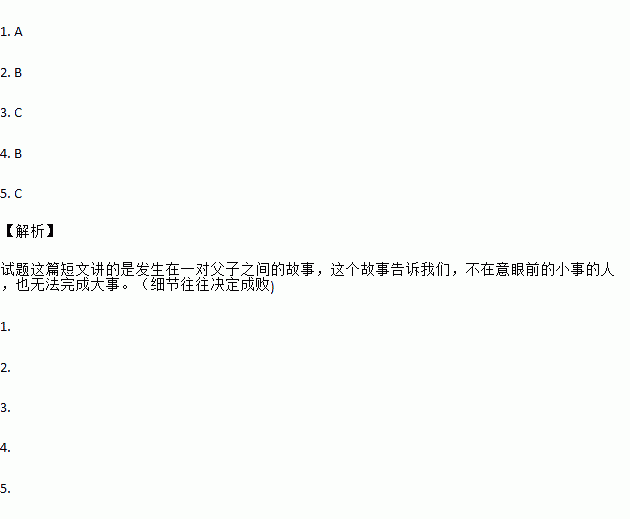题目内容
One day, a farmer was walking along a road with his son Thomas. The father said, “Look! There’s a horseshoe. Pick it up and put it in your bag.” Thomas said, “It isn’t worth the trouble.” His father said nothing but he picked it up himself. When they got to a nearby town, they had a rest. There the farmer sold the horseshoe and with the few pennies he bought some grapes.
It was very hot, and there wasn’t a house or a tree where they could have a rest. Thomas felt too thirsty to walk on. At this time, his father dropped a grape on the ground and Thomas picked it up quickly and ate it. After a while, his father dripped another grape and once again. His son picked it up and put it in his mouth.
And so they went on. The old farmer dropped the grapes and the son picked them up. When Thomas had eaten up all the grapes, his father said to him, “My dear son, if you had bent down early to pick up that horseshoe, it would not have been necessary for you to bend so many times for the grapes, always remember the lesson: A person who does not worry about the little things will find that he can not do the great things.”
1.The horseshoe was picked up by .
A. The father B. the son C. nobody D. the shop assistant
2.The father bought some after he sold the horseshoe.
A. pennies B. grapes C. trees D. water
3.Thomas picked up the grapes and ate them because .
A. his father wanted him to eat them
B. he liked them
C. he was thirsty
D. he wanted to sell them
4.The father dropped the grapes one by one because he wanted .
A. his son to eat them all
B. to teach his son a lesson
C. to make fun of his son
D. to show his love
5.From the passage, we can learn with .
A. if we want to eat grapes, we must pick up a horseshoe
B. a horseshoe is so expensive that it can bring us much money
C. we should worry about small things before we do the great things
D. It’s important to pick up a horseshoe on the road

